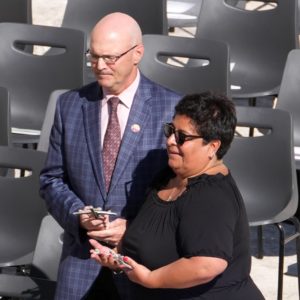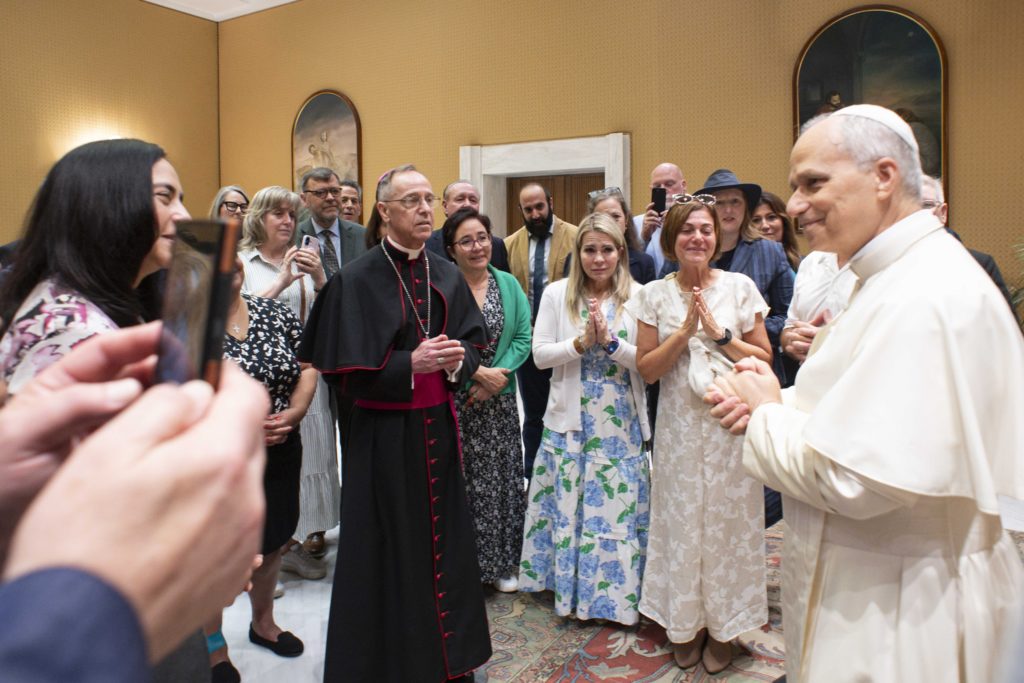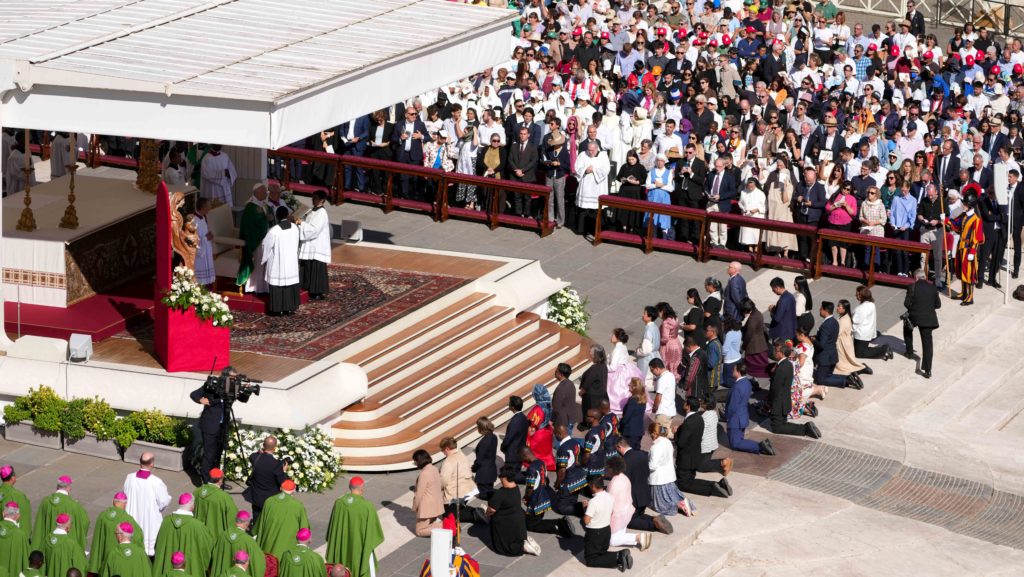When catechists teach, their aim is not simply to pass on information about the faith but to "place the word of life in hearts, so that it may bear the fruits of a good life," Pope Leo XIV said.
"The Gospel announces to us that everyone's life can change because Christ rose from the dead. This event is the truth that saves us; therefore, it must be known and proclaimed," the pope told some 20,000 catechists from more than 115 countries attending the Jubilee for Catechists.
But just proclaiming the Good News is not enough, the pope said in his homily at Mass Sept. 28 in St. Peter's Square. "It must be loved. It is love that leads us to understand the Gospel."
During the liturgy, Pope Leo formally installed in the ministry of catechist 39 women and men from 16 countries.

Before the pope gave his homily, a deacon called the names of each of the 39, who answered in Italian, "Eccomi," or "present." After the homily, Pope Leo presented each of them with a crucifix.
"Let your ministry ever be grounded in a deep life of prayer, let it be built up in sound doctrine and animated by genuine apostolic zeal," the pope told them. "As stewards of the mission entrusted to the church by Christ, you must always be ready to give an answer to anyone who asks you for a reason for the hope that is in you."
The Gospel reading at the Mass was the parable of the rich man and Lazarus from Luke 16:19-31.
In the parable, the pope said, Lazarus is ignored by the rich man "and yet God is close to him and remembers his name."
But the rich man has no name in the parable, "because he has lost himself by forgetting his neighbor," the pope said. "He is lost in the thoughts of his heart: full of things and empty of love. His possessions do not make him a good person."
"The story that Christ tells us is, unfortunately, very relevant today," Pope Leo said. "At the doorstep of today's opulence stands the misery of entire peoples, ravaged by war and exploitation."
"Through the centuries, nothing seems to have changed: how many Lazaruses die before the greed that forgets justice, before profits that trample on charity, and before riches that are blind to the pain of the poor," he said.
In the parable, the rich man dies and is cast into the netherworld. He asks Abraham to send a messenger to his brothers to warn them and call them to repent.
The Gospel story and the words of Scripture that catechists are called to share are not meant to "disappoint or discourage" people, but to awaken their consciences, the pope said.
Echoing the words of Pope Francis, Pope Leo said the heart of catechesis is the proclamation that "the Lord Jesus is risen, the Lord Jesus loves you, and he has given his life for you; risen and alive, he is close to you and waits for you every day."
That truth, he said, should prompt people to love God and to love others in return.
God's love, he said, "transforms us by opening our hearts to the word of God and to the face of our neighbor."
Pope Leo reminded parents that they are the first to teach their children about God, his promises and commandments.
And he thanked everyone who has been a witness to others of faith, hope and charity, cooperating in the church's "pastoral work by listening to questions, sharing in struggles and serving the desire for justice and truth that dwells in the human conscience."
Teaching the faith is a community effort, he said, and the Catechism of the Catholic Church "is the 'travel guidebook' that protects us from individualism and discord, because it attests to the faith of the entire Catholic Church."
US pilgrims at Jubilee of Catechists have private audience with pope
Among the estimated 20,000 pilgrims in Rome for the Jubilee of Catechists, a group of three dozen from the United States had their own private audience with Pope Leo XIV.
The pilgrims -- an archbishop, volunteer parish catechists, diocesan employees, religious sisters and two staff members from the U.S. Conference of Catholic Bishops -- met with the pope Sept. 27 before his Jubilee audience.
The pope told them that all Catholics, by virtue of their baptism, are called to be teachers of the faith, said Marilyn Santos, associate director of the USCCB Secretariat of Evangelization and Catechesis.

The next morning, during Pope Leo's Jubilee Mass, he formally installed in the ministry of catechist Santos and David Spesia, executive director of the secretariat. The first reading at the Mass was proclaimed by another member of the pilgrimage: Richard Gallagher, a volunteer catechist at the Basilica of St. Edward in Palm Beach, Florida.
Archbishop Charles C. Thompson of Indianapolis, chair of the bishops' Committee for Evangelization and Catechesis, led the pilgrimage.
"We are just being pilgrims of hope," the archbishop told Catholic News Service. The pilgrimage was an opportunity to "deepen our own our faith, our own sense of God's grace and presence in our lives and our own calling -- rooted in all of our baptisms, whether bishop or religious, consecrated, single, married, what have you -- to live out our call to holiness and mission and be witnesses of the faith."
The formal institution of some people in the ministry of catechist, a possibility opened by Pope Francis in 2021, shows "how important, how essential catechists are to the church," the archbishop said. "And I think it coincides beautifully with the synodality focus on co-responsibility, that we are all co-responsible for passing on the faith."
The U.S. bishops are working on a national directory on the three instituted ministries Pope Francis formalized: catechist, lector and acolyte. The directory aims provide a theological understanding of the ministries, the formation needed, age requirements, the duration of the ministry and their role in a parish and diocese.
Spesia said that in the United States parish catechists are "the 'little engine that could' that drives the church and hands on the faith," and recognizing that with a special Jubilee celebration "is just a beautiful thing."
Asked about being chosen to be instituted a catechist by Pope Leo, Santos said, "I'm thrilled. I'm a little shocked. I'm honored."
Parish catechists "are priceless because they are the boots on the ground, so to speak," she said. Those instituted in the ministry of catechist answer to their diocesan bishop and are called to be an example and resource for others.
Patrick Donovan, director of the Institute for Catholic Formation in the Diocese of Bridgeport, Connecticut, also was part of the pilgrimage.
He told CNS he hoped no one would see the formal institution of catechists as somehow saying that only some Catholics are called to share and teach others the faith.
"I think oftentimes we mistakenly talk about catechesis as a chore, catechesis as a project, as a program. It begins and it ends," he said. But it is an ongoing process of growing in the faith and in one's ability to share it with others.
"For me, the perspective is all about what we can do to help mom and dad be the best witnesses of the faith," Donovan said, giving parents "the language to articulate the faith" and share it with their children each day.
"We have to do less of the hostage situation with young people" forced to attend religious education classes, he said, "and more of giving the language to articulate the faith to mom and dad and grandparents."

